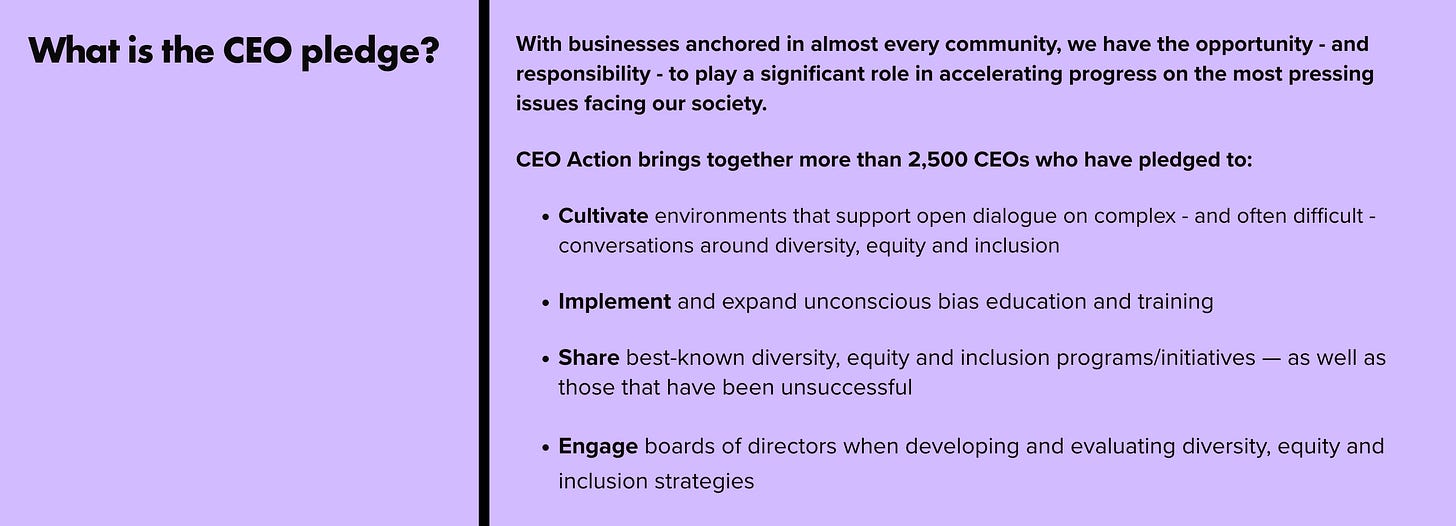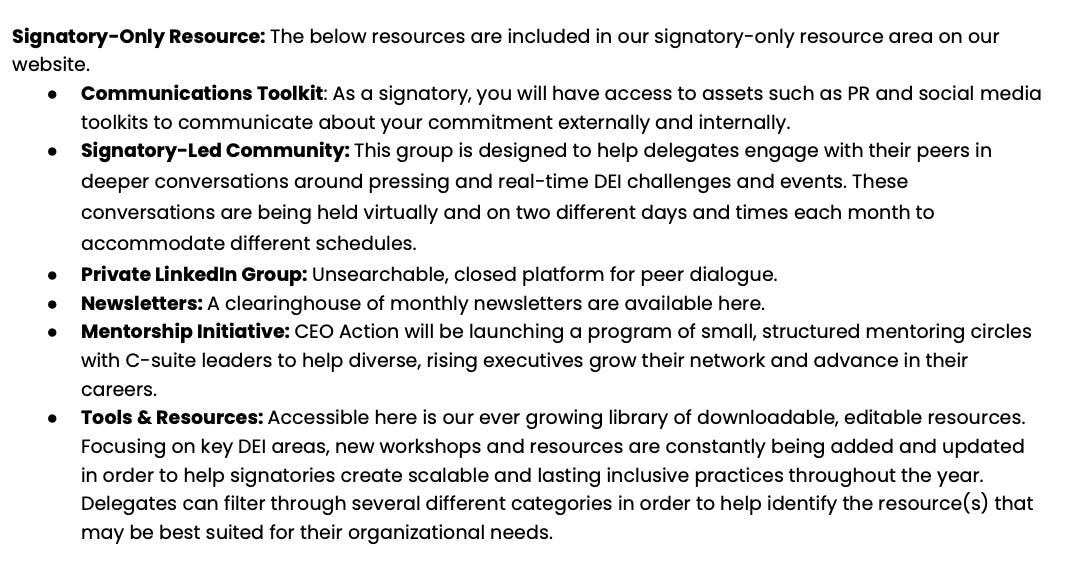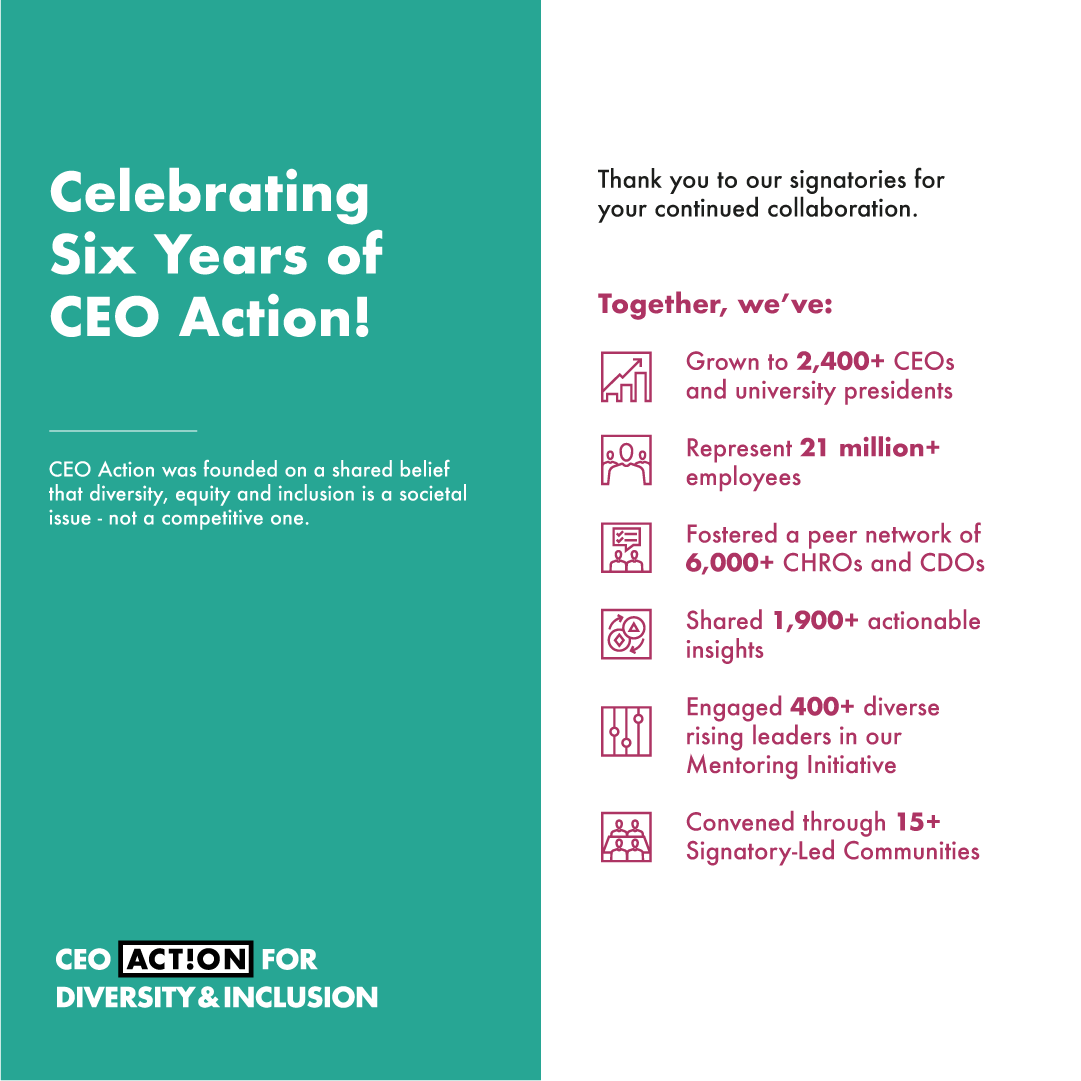The DEI Group that Infiltrated Corporate America
How CEO Action convinced major corporations to embed DEI into the workplace and what we can do about it
The Spread of DEI
From the Bud Light fiasco of 2023 to Robby Starbuck’s unfolding crusade against major corporations, the past 18 months have dramatically increased public awareness around diversity, equity, and inclusion (DEI) policies. Many pundits have argued the recent electoral landslide was a repudiation of this wokeness. Positioning Republicans with unified control of the government, it is clear the American people desire major government reform.
One of the crucial issues Americans expect to see the Trump administration tackle is DEI. On day one, Trump will likely overturn President Biden’s executive order to advance racial equity through the federal government, which established arbitrary racial preferences over merit in government affairs. However, the Trump administration will also have the power to push back one of the biggest drivers of DEI in America, major public corporations, by enforcing existing civil rights laws.
According to the Harvard Law School Forum on Corporate Governance, about half of the S&P 500 report having “quantitative, time-bound DEI goals” and one-third have “representation goals” that reflect discriminatory racial and gender preferences in the company. Beyond quotas, corporations also push DEI through policies such as transgender healthcare benefits (including for minors), DEI training, inclusive language guides, and funding controversial organizations.
To effectively push back on DEI in corporate America, we need to understand which organizations bear responsibility for introducing these policies and what we can do to combat their efforts.
The Founding of CEO Action
Many activist organizations made front-page news this year including the Global Alliance for Responsible Media (GARM), which was functionally a left-wing censorship cartel, and the Human Rights Campaign (HRC), an LGBTQ+ activist group that managed to secretly mainstream transgender benefits throughout corporate America. Lesser known, though no less dangerous, is the group pushing DEI throughout corporate America called CEO Action for Diversity and Inclusion (CEO Action).
On June 12th, 2017, CEO Action launched and released its Diversity & Inclusion pledge - a pact to advance DEI in the workplace. Signed by more than 150 CEOs, the pledge commits its signatories to:
Create and maintain “environments, platforms, and forums” for employees to discuss DEI
Implement and expand unconscious bias education
Create an accountability system to track DEI progress and
Strategize on DEI programs/initiatives with other signatories
The 10 founding members of CEO Action include the Big Four consulting firms Deloitte, KPMG, PwC, and Ernst & Young, all of whom offer DEI consulting services (no surprise). Over time CEO Action has slowly expanded its scope and influence.
The Growth and Influence of CEO Action
In November 2017, CEO Action launched the “CEO Action President’s Circle” to advance DEI on college campuses. The inaugural signatories were the University of San Francisco, AACSB International, Bentley University, Binghamton University, Lehigh University, Miami University of Ohio, National HBCU Deans Roundtable, Oregon State University, the University of Dayton, and Xavier University of Louisiana. CEO Action wanted to increase students’ “exposure to and comfort level with” DEI so that they will be more likely to “advance active change” once entering the workforce.
In the fall of 2018, CEO Action went on a “Check Your Blind Spots" mobile tour, making 100 stops across the country to promote DEI with free educational sessions and materials. The tour featured appearances from musical artists, celebrities, and business leaders “to fuel social awareness and further motivate action around diversity and inclusion in business and society.”
A pivotal moment for CEO Action was the summer of 2020. Following the death of George Floyd, tens of billions of dollars were pledged toward BLM and other organizations fighting for “racial equity” or against “systemic racism”. Corporations also flocked to sign the CEO Action pledge and commit to specific DEI actions in their workplaces. CEO Action subsequently revamped its website and modified its pledge to require board engagement in developing and evaluating DEI strategies.
In October 2020, CEO Action launched “CEO Action for Racial Equity”, which was a fellowship that equipped CEO Action signatories to “advance racial equity through public policy.” Over 100 signatory organizations participated in this fellows program.
CEO Action has always offered free DEI resources to the general public on its website, but signatories receive access to additional benefits including a PR communications toolkit on DEI, a private LinkedIn group, and a “growing library” of DEI resources.
CEO Action also catalogs the DEI initiatives of its signatories on its Actions Database. There are over 2,000 recorded DEI actions signatories have taken, including commitments to implement DEI training (unconscious bias, anti-racism, allyship, etc.), use racial and gender quotas in recruitment/hiring/promotions, conduct pay equity reports, and promote access to transgender healthcare.
As of 2024, CEO Action has over 2,500 signatories, representing over 85 industries and 21 million employees. Furthermore, it has created a private network of over 6,000 Chief Human Resource Officers and Chief Diversity Officers. CEO Action has firmly established itself as the largest business-led initiative advancing DEI in the workplace.
SHRM Acquires CEO Action
On October 1, 2024, SHRM acquired CEO Action for Diversity & Inclusion from PwC, rebranding itself as SHRM CEO Action for Inclusion & Diversity. SHRM is the largest professional human resources membership association, with 525 chapters and 340,000 members worldwide. Since SHRM affects 362 million employees, the influence of CEO Action's materials on corporations will increase exponentially. Though SHRM stopped using the term equity this summer, we should not be under any pretenses about its agenda.
According to SHRM’s press release in October, its acquisition of CEO Action “underscores its deep commitment to fostering diverse, equitable, and inclusive work environments” (emphasis added). SHRM CEO Action still aims to be “the trusted, data-driven advisor C-suite executives require to prioritize” DEI principles in the workplace and “will be a game changer for the world of work and HR professionals”. SHRM CEO Action is not “merely about adopting inclusive practices—it’s about reshaping leadership itself.”
Upon acquiring CEO Action, SHRM made the CEO Action signatory list private, indicating that SHRM feels the mounting pressure against DEI. However, you can still view a list of their signatories if you have the original link. SHRM CEO Action will likely make its Actions database private as well, highlighting the importance of archiving corporate information, especially in light of recent attacks on archiving services. To view a complete list of CEO Action signatories and the actions they have taken, view the 1792 Exchange’s Corporate Bias Ratings database.
Moving forward
One of the rules I adopted for my Substack is to balance criticism with optimism by suggesting solutions to the problems I critique. Here are various ways DEI can be fought in corporate America:
1) Public Pressure Campaigns
The first major success against wokeness in major corporations was the Bud Light boycott of 2023 which cost Bud Light its spot as America's best-selling beer following their sponsorship of a transgender influencer. Despite the backlash, Anheuser Busch never made any changes to its policies. Perhaps it would have if the campaign requested specific changes from the company.
This clarity has been the approach of journalist Robby Starbuck, who has listed what major corporations need to do to get out of divisive social and political issues. Once targeted, if a company resists, Robby posts daily about their activism until they pledge to change. The amplification of his posts through Twitter has informed the general public and proven to be the most effective course of action against wokeness in corporations to date.
Liking and reposting this content, as well as tagging the companies and their executives so they can see it, are easy ways anyone can fight back. Another way to engage as an individual is to take ownership of the campaign. For example, Harley-Davidson bikers took the emblem off their bikes and mailed them back to corporate headquarters, with one rider blowing up his bike to add heat to the boycott.
2) Shareholder Action
Shareholders of CEO Action member corporations should email investor relations and ask about why they are a signatory given SHRM CEO Action's encouragement of divisive and discriminatory policies. Shareholders can also leverage their assets through shareholder proposals requesting the company withdraw its SHRM CEO Action membership and publish an online report detailing its relationship with CEO Action. This report could include information such as: how long it has been a signatory, money given to CEO Action (if any), money given to the founding firms’ DEI consulting services (if any), and any DEI resources offered or actions taken because of its CEO Action membership.
3) Alternatives to DEI training
Critiquing DEI training will not be enough to extinguish it. To create long-term change, someone should develop workplace training that champions universal principles such as mutual respect and professionalism. This alternative training would allow corporations to address inclusion without resorting to divisive DEI frameworks and would better comport with the law and employee sentiments.
4) The Enforcement of Civil Rights Law
The overturning of affirmative action in 2023 set the precedent to sue corporations over DEI employment policies because they require discrimination based on race and sex in contradiction to Title VII of the Civil Rights Act of 1964. The incoming Trump administration has the opportunity to continue this fight against DEI through the enforcement of existing civil rights laws.
The administration is also likely to pass Congressman Michael Cloud’s Dismantle DEI Act which, aside from extinguishing DEI in the federal government, could have the added benefit of making the social climate less favorable toward DEI. This is important because many executives are now looking for an opportunity to get out of DEI to cut costs and avoid unnecessary legal risks. Let’s hope these next four years provide those opportunities in ample supply.






